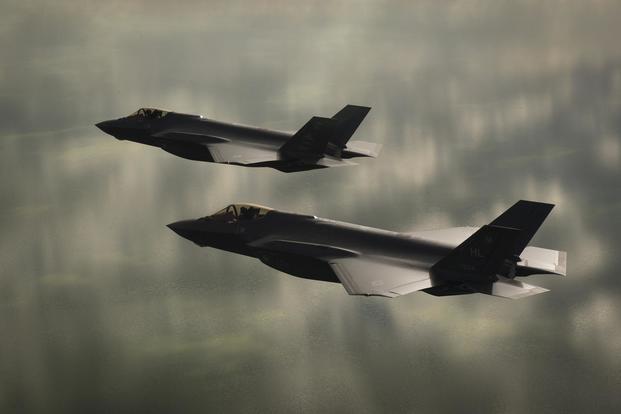The Pentagon says it will cost $500 million to $600 million to find new suppliers for F-35 Joint Strike Fighter parts currently produced by Turkey as that country is ousted from the stealth fighter program.
Following a statement from the White House that Turkey will no longer be involved in the F-35 program because of its recent purchase of Russian-made S-400 surface-to-air-missile systems, Under Secretary of Defense for Acquisition and Sustainment Ellen Lord and Deputy Under Secretary of Defense for Policy David Trachtenberg told reporters during a briefing Wednesday that the U.S. will spend that much "in non-recurring engineering in order to shift the supply chain" as Turkey "unwinds" from the program by March 2020.
Turkey had "$1 billion in commitments" to the program "as we sit here today," Lord said during the briefing.
The cost disclosure follows U.S. efforts to begin removing Turkey from the program.
Related content:
- Trump: Turkey Will Be Out of F-35 Fighter Jet Program After S-400 Buy
- US Outlines Plan to Remove Turkey from F-35 Program
- Over US Warnings, Turkey Gets Russian-Made S-400 Missile System
- Upgrades, Development to F-35 Jet Will Cost $1 Billion Per Year
Lord said that all of Turkey's instructors, pilots, maintainers and personnel who have access to the Joint Program Office are required to leave the United States by July 31. She first outlined those stipulations June 7.
"Our partnership regrets that we have arrived at this moment," Trachtenberg said, adding that the U.S. had "repeatedly" stressed to Turkey that it cannot operate both the F-35 and the S-400.
"The U.S. has full confidence in the F-35 and supply chain," Lord said. She added that the U.S. and its allies are aligned in the decision to remove Turkey from the program in light of the S-400 delivery.
"Unfortunately, Turkey's decision to purchase Russian S-400 air defense systems renders its continued involvement with the F-35 impossible," the White House said in a statement earlier Wednesday. "The F-35 cannot co-exist with a Russian intelligence collection platform that will be used to learn about its advanced capabilities."
The announcement came after President Donald Trump remarked Tuesday that Turkey's S-400 purchase created "a very tough situation" for the U.S.
According to the White House statement, the "military-to-military relationship is strong, and we will continue to cooperate with Turkey extensively, mindful of constraints due to the presence of the S-400 system in Turkey."
Lord and Trachtenberg reaffirmed the White House's stance, and said upcoming exercises with Turkey in Georgia, Germany and Ukraine remain on schedule.
"We will continue to work with all our NATO allies on ways of making sure the alliance and security is preserved and protected to the maximum extent possible," Trachtenberg said.
"As the president said, the U.S. still values its strategic partnership with Turkey," Lord added.
Turkey's decision to buy the S-400, known to Moscow as the "F-35 killer," has been in the works for years. In 2017, Turkey firmed up a verbal agreement with Russia to purchase the S-400. It came after relations between Turkey and Russia had slowly begun to ease: Turkish President Recep Tayyip Erdogan in 2016 formally apologized to Russian President Vladimir Putin for the shootdown of a Russian Sukhoi Su-24 bomber aircraft over Turkish airspace in 2015.
Lord said Pentagon officials had been aware of Turkey's intentions and raised concerns over the vulnerabilities posed should Turkey operate the F-35 and S-400 simultaneously. She explained during the June 7 briefing that prolonged proximity between the F-35 and S-400 systems might allow the SAM to "understand the profile" of the jet.
Lockheed Martin Corp., the stealth jet's manufacturer, said it is working closely with the U.S. government.
"This is a government-to-government matter and, as always, we are following official U.S. government guidance as it relates to [the] delivery of the F-35 to Turkey and the export of goods from the Turkish supply chain," the defense company said in a statement following the briefing.
"Lockheed Martin has been partnering closely with the U.S. government and our supply chain to minimize impact to the F-35 program. Over the last several months, we've been working to establish alternative sources of supply in the United States to quickly accommodate Turkey's current contributions to the program," according to the statement. "These actions will limit any future production or sustainment impact, and we remain on track to meet our commitment of delivering 131 F-35s this year. As F-35s in the fleet deliver exceptional capability and costs continue to come down, we see increasing global demand for the F-35 that will grow the total program of record."
The U.S. will look to American parts suppliers for the time being as Turkey slowly exits the program, officials have said.
Lord last month said the ouster could be reversed should Turkey comply with the U.S.' requests.
However, Lord and Trachtenberg could not definitively say Wednesday whether that offer would stand should Turkey divest its S-400 equipment in the near future.
-- Oriana Pawlyk can be reached at oriana.pawlyk@military.com. Follow her on Twitter at @Oriana0214.












